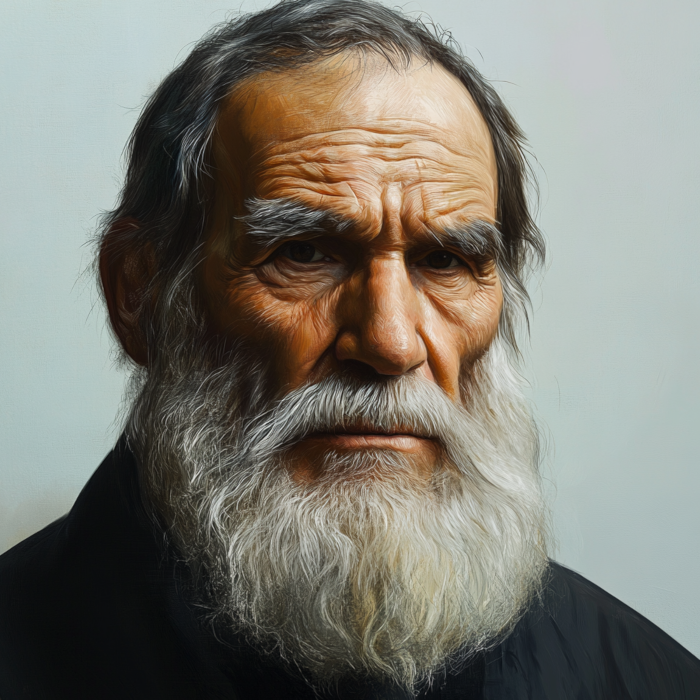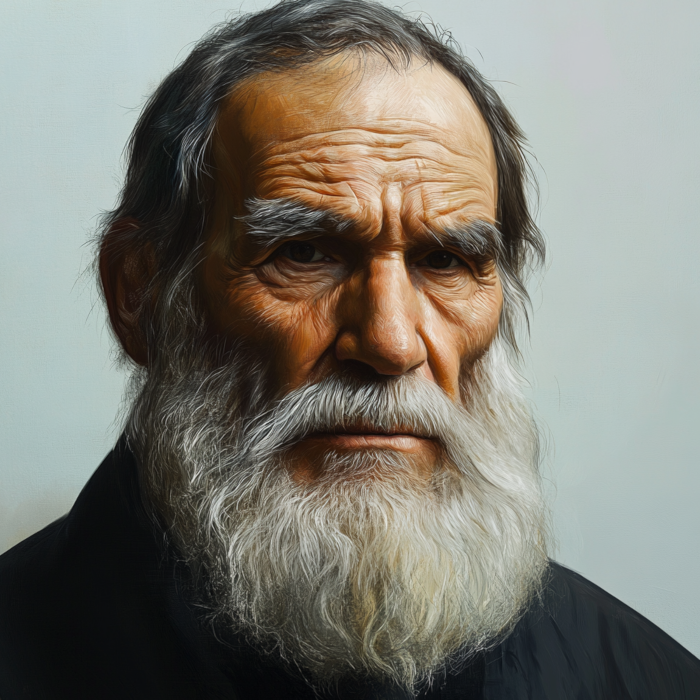
Leo Tolstoy (1828-1910) was one of Russia’s greatest authors and a key figure in world literature. Known for his profound storytelling and exploration of human existence, his works include monumental novels such as War and Peace and Anna Karenina. Tolstoy was also a prominent social thinker, Christian anarchist, and advocate for nonviolent resistance, influencing figures like Mahatma Gandhi and Martin Luther King Jr. His life was marked by a journey of intellectual and spiritual exploration, leading him from aristocratic privilege to a search for moral and spiritual truth. Here is an overview of his life and work:
Early Life and Background
- Birth and Family: Lev Nikolayevich Tolstoy was born on September 9, 1828, at the family estate of Yasnaya Polyana, located about 200 kilometers south of Moscow. Tolstoy was born into an aristocratic family, with connections to the Russian nobility. His parents died when he was young, and he was raised by relatives.
- Education and Early Struggles: Tolstoy attended Kazan University, where he studied law and languages, but he found formal education unfulfilling and dropped out. He returned to his estate, struggling with purpose and leading a life that included gambling and a desire for self-improvement. He began to write during this time, documenting his quest for meaning in various journals.
Military Service and Early Literary Success
- Military Service: In 1851, Tolstoy joined the Russian Army, serving in the Caucasus and later in the Crimean War. His experiences in the army provided the material for his early literary works, including Sevastopol Sketches, which portrayed the brutality of war in a stark and realistic manner.
- Early Literary Success: Tolstoy's early works, such as Childhood, Boyhood, and Youth, were semi-autobiographical and portrayed his experiences growing up. These stories were well received and established him as an important literary figure. His realistic portrayal of the internal emotional struggles of his characters became a defining feature of his writing style.
Major Works
Tolstoy is best known for two of the greatest novels in world literature: War and Peace and Anna Karenina.
War and Peace (1869)
- Scope and Themes: War and Peace is an epic novel set during the Napoleonic Wars, focusing on the lives of several aristocratic families. The novel weaves together individual stories with broader historical events, exploring themes of fate, free will, love, war, and the meaning of life.
- Historical and Philosophical Perspective: The book is notable for its blend of fictional storytelling and historical narrative, as Tolstoy challenges the idea of historical determinism. He suggests that the course of history is shaped by countless ordinary individuals rather than just great men or leaders.
- Reception: Upon its publication, War and Peace was celebrated for its complexity, realism, and philosophical depth. The novel’s characters, such as Pierre Bezukhov, Prince Andrei Bolkonsky, and Natasha Rostova, are among the most richly drawn in all of literature.
Anna Karenina (1877)
- Plot and Themes: Anna Karenina is a tragic novel about love, infidelity, and social norms, revolving around the doomed affair between Anna and Count Vronsky. The novel contrasts their story with that of Konstantin Levin, whose search for happiness and meaning reflects Tolstoy's own philosophical journey.
- Realism and Morality: Tolstoy's exploration of social norms, the consequences of passion, and the tension between personal fulfillment and duty creates a powerful narrative. The opening line, "Happy families are all alike; every unhappy family is unhappy in its own way," reflects the complex human relationships that Tolstoy masterfully explores.
Religious and Philosophical Transformation
- Spiritual Crisis: In the late 1870s, Tolstoy experienced a profound spiritual and existential crisis. Despite his literary success, he found himself struggling with questions of life, death, and the meaning of existence. He became increasingly dissatisfied with his privileged lifestyle and sought answers in religion and philosophy.
- Religious Conversion: Tolstoy's search led him to a personal interpretation of Christianity, which he described in his book A Confession (1882). He rejected the Orthodox Church’s rituals and dogma, instead emphasizing Jesus' teachings on love, compassion, and nonviolence. He called for a return to simple living and a focus on ethical behavior.
- Nonviolent Resistance: Tolstoy’s interpretation of Christianity emphasized pacifism and nonviolent resistance to evil, which he articulated in The Kingdom of God Is Within You (1894). This work had a profound influence on the development of modern nonviolent resistance movements and inspired leaders like Mahatma Gandhi in India and Martin Luther King Jr. in the United States.
Later Life and Social Activism
- Critique of Government and Church: Tolstoy became an outspoken critic of the Russian government and the Orthodox Church, both of which he saw as corrupt institutions that perpetuated inequality and violence. His anti-establishment views led to his excommunication from the Orthodox Church in 1901.
- Social Reforms: Tolstoy was deeply concerned with issues of social justice and equality. He advocated for the redistribution of land, the abolition of private property, and the improvement of peasant life. He used his wealth to help the poor and tried to live simply, in line with his beliefs.
- Tolstoyan Movement: Tolstoy’s followers, known as Tolstoyans, tried to live according to his principles, which included pacifism, vegetarianism, and communal living. The movement spread across Russia and other parts of the world, emphasizing ethical behavior, simplicity, and nonviolence.
Death and Legacy
- Final Years: In his later years, Tolstoy’s relationship with his family, particularly his wife, Sophia Tolstaya, became strained. Sophia had supported Tolstoy through much of his career, but they increasingly clashed over his radical ideas and the fate of the family’s estate. In 1910, at the age of 82, Tolstoy left home in an attempt to find peace and live in simplicity.
- Death: Tolstoy fell ill during his journey and died of pneumonia on November 20, 1910, at the Astapovo railway station. His death was widely mourned, and he was buried at his estate, Yasnaya Polyana, without any religious ceremony, in line with his beliefs.
Literary and Cultural Impact
- A Giant of Literature: Tolstoy’s influence on world literature is immeasurable. His works are celebrated for their depth of character, moral questioning, and intricate depiction of society. Tolstoy's psychological insight and realistic style influenced countless writers, including Fyodor Dostoevsky, James Joyce, Marcel Proust, and Virginia Woolf.
- Themes of Humanity: Tolstoy’s works explore universal themes—love, war, peace, morality, and the search for meaning. His portrayal of the human condition, especially his exploration of individual struggles within the context of broader social and historical forces, continues to resonate with readers today.
- Influence on Social and Political Thought: Beyond literature, Tolstoy’s ideas about nonviolent resistance and social justice have inspired many influential leaders and social movements around the world. His writings on pacifism were a key influence on Mahatma Gandhi’s philosophy of Satyagraha, which played a significant role in India’s struggle for independence from British rule.
Selected Works
- War and Peace (1869) - An epic novel set during the Napoleonic Wars, exploring history, destiny, and the human spirit.
- Anna Karenina (1877) - A tragic exploration of love, fidelity, and society in 19th-century Russia.
- The Death of Ivan Ilyich (1886) - A novella that examines mortality and the meaning of life through the story of a man facing death.
- Resurrection (1899) - A novel focusing on themes of redemption, justice, and the flaws of institutionalized religion and law.
- A Confession (1882) - An autobiographical work that details Tolstoy's spiritual crisis and quest for meaning.
- The Kingdom of God Is Within You (1894) - A treatise on Christianity, nonviolence, and moral philosophy, which had a profound influence on later thinkers and activists.
Leo Tolstoy remains an iconic figure in literature and social thought. His exploration of moral questions, his detailed depictions of Russian society, and his deeply humanistic approach have made his works enduring masterpieces. Tolstoy's legacy is not only that of a great novelist but also of a profound thinker whose search for truth and justice has inspired generations worldwide.



